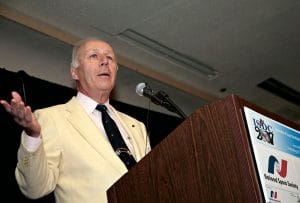A writer, Bova liked science: in the 1950s he was a technical writer for the U.S. Naval Research Laboratory’s Project Vanguard, which planned to launch the first artificial satellite into orbit. There was a lot of competition to be first: the U.S. Army Ballistic Missile Agency was trying to build a satellite to launch on a modified Redstone rocket, and U.S. Air Force had a plan to use the Atlas rocket. The Air Force soon fell back: the Atlas hadn’t been built yet. All three projects were dismayed when Russia launched Sputnik I on October 4, 1957, then Sputnik II on November 3. The Army, aided by the Jet Propulsion Laboratory before it became a NASA center, beat the Navy into space with the third artificial satellite on January 31, 1958. Vanguard did launch as the fourth, and that remains the oldest man-made object in Earth orbit.

Bova moved on to private industry, but was having more success in science fiction, rather than scientific technical writing, selling a novel (The Star Conquerors) in 1959, and short stories to the many “pulp” magazines of the day. He wrote the Grand Tour novel series about the exploration and colonization of the Solar System by humans. When John Campbell, editor of Analog Science Fact & Fiction, died in 1971, Bova was brought in to replace him, and in 1978 went on to edit a much more slick science magazine, Omni, from 1978 to 1982.
Bova also served as President of the National Space Society, and the Science Fiction and Fantasy Writers of America. Along the way he won six Hugo Awards, the Robert A. Heinlein Award for his work in science fiction, and the Lifetime Achievement Award from the Arthur C. Clarke Foundation. “Dr. Bova’s writings significantly contributed to NSS’s mission towards the settlement of space and gave us insights into many issues we’ll need to address in the final frontier,” said Karlton Johnson, Chairman of the Board of Governors of the National Space Society. With more than 130 published books, in 2004 the New York Times dubbed Bova “the last of the great pulp writers.” Benjamin William Bova died November 29, from Covid-19. He was 88.
